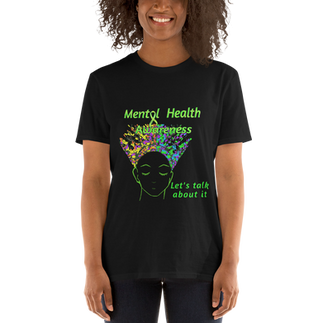"one person's mental health status can never be defined by another person's mental health status..."
Mental health! What is mental health and why is it such a hard topic to discuss openly? The first part of this question can be defined in several ways. According to the Centers for Disease Control and Prevention, mental health is defined as “health including our emotional, psychological, and social well-being. It affects how we think, feel, and act.” My personal experiences lead me to define mental health in a less formal way. I see mental health as a state of well-being that comes from personal experiences that will vary differently from one person to another. A person’s culture influences (the way they were raised), physical environment, and spiritual background all have influence on their mental health in my opinion. In other words, one person’s mental health status can never be defined by another person’s mental health status even if they are experiencing similar situations.
Now to the next part of the question, why is mental health such a hard topic to discuss? There are many reasons as to why the topic of mental health is not easily approached by many, and I will start with one of the most infamous reasons, stigma.
"...the stigma surrounding mental health needs to end."
Stigma. The Merriam-Webster dictionary defines stigma as “a set of negative and unfair beliefs that a society or group of people have about something...a mark of shame or disgrace.”
Stigmas have a negative effect on how you view yourself as well as how others view you. Stigmas can prevent people from seeking support and help, for valid concerns that they may be experiencing with their mental health. This is unfair to everyone involved and the stigma surrounding mental health needs to end.
Misconceptions (also stigmas). There are many misconceptions about mental health. It is viewed as something that is totally in our control by many, and if you can’t control it then you are weak. A few of these misconceptions can be summed in the following categories:
Weakness
Mental health only effects certain groups of people
You have control over mental health by changing your mindset (it’s a choice, you choose)
Now don’t get me wrong, you do have some control over your thinking and your mindset. However, nobody chooses to have a mental illness or mental instability. It is not something that is in our control. There are many factors that contribute to mental instability, including physical health.
Crazy or Delusional (stigma). Many people associate mental health with being “crazy” or “delusional.”
"Mental health also encompasses positive traits"
Many people only associate mental health with negative qualities and illnesses. Mental health is more than the presence of mental illnesses or issues. Mental health also encompasses positive traits. For example, feeling competent in our abilities or talents is a positive trait of mental health. Other examples of positive mental health traits include having great self-esteem, being able to remain calm under pressure, and understanding when things are beyond our control and knowing how to deal with them. These are all positive qualities of mental health.
Fear and societal pressure. Fear of being treated poorly or differently by family, friends, coworkers, etc.
Fear and societal pressure play a major role in why many individuals chose not to speak on mental health issues. This is where the previously mentioned stigmas come into play. Due to being afraid of being judged unfairly, many individuals chose to just ignore the topic altogether and pretend that it doesn’t exist. This is one of the reasons why awareness is so important. We must get out of the mindset that discussing mental health is shameful. There is nothing shameful about wanting to take control and better our lives.
Helplessness. Many who are experiencing mental issues exhibits feelings of helplessness and/or shame.
The helplessness feeling is pretty much self-explanatory. When we are feeling alone and like we don’t have anyone to confide in that will understand, we are bound to feel helpless. If we think about all the stigmas that surround mental health issues and why many individuals don’t speak about it and seek help, it’s understandable that helplessness is a common emotion that is experienced with mental health issues.
These are only a few of the reasons why mental health is such a difficult subject to discuss. There are many more reasons that can be explained in depth; however, I chose these specifically because they seem to be the most prevalent. The main point that I would like to stress in this blog is that mental health is IMPORTANT, and it isn’t something that should be brushed to the side and taken lightly. All the stigmas surrounding mental health need to be broken down and ended. People should not feel shame for wanting to seek help for issues that are no longer in their control. Seeking help for mental health should be welcomed with support and from a safe space. Let’s be for real, in a society where we can talk about any and everything else underneath the moon, why can’t we talk about the importance of mental health? In my next blog post, I will be talking about the main thing that help me stay mentally focus and gets me on track whenever I am feeling a little mentally unstable. Thank you for taking the time out to read my views on the discussion of mental health. Until next time…stay calm, positive, and humble!
Daphne Oh
Represent Mental Health Awareness: Let's Talk About It!
References:
Centers for Disease Control and Prevention. (2023). About Mental Health. Retrieved from https://www.cdc.gov/mentalhealth/learn/index.htm
"stigma." Merriam-Webster.com. 2011. https://www.merriam-webster.com (8 June 2023).







Comments